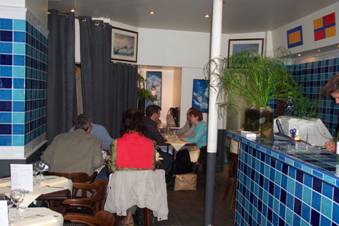Turning the Tables at the Fables
Les Fables de la Fontaine
Les Fables de la Fontaine (sometimes mistakenly but understandably identified in print as Les Tables…) is an intimate and informal bistro which can easily be missed; there are pastries in the window which make it look like a patisserie. It is in every sense a family restau rant. First, it belongs to and is closely supervised by Christian Constant and his wife. Second, it is one of a growing family of restaurants which threaten – in the nicest possible way – to take over rue St Dominique. (Nearby are Cafe Constant and Le Violin d'Ingris. You could do worse than eat your way consecutively from one to another, in any order.) And thirdly, Les Fables positively welcomes children. The table next to ours was occupied by an American couple with two boys about four and six who were accommodated with bowls of small pasta, easily eaten by hand – no silly attempts to go the McDisney route.
rant. First, it belongs to and is closely supervised by Christian Constant and his wife. Second, it is one of a growing family of restaurants which threaten – in the nicest possible way – to take over rue St Dominique. (Nearby are Cafe Constant and Le Violin d'Ingris. You could do worse than eat your way consecutively from one to another, in any order.) And thirdly, Les Fables positively welcomes children. The table next to ours was occupied by an American couple with two boys about four and six who were accommodated with bowls of small pasta, easily eaten by hand – no silly attempts to go the McDisney route.
The dining room is a small L-shaped space surrounding a counter, with tables tightly packed but still accommodating only 21 covers. There are also outdoor tables in good weather. The cuisine is seafood, and so the décor is appropriately blue and white, like that other long-time Paris favorite of mine, Le Petit Niçois. Their carte has a lighthouse motif.
Against all the rules, I ordered two soups, crab followed by bouillabaisse. Hearing my accent, our hostess warned me that they were in fact both soups – there are Americans that wouldn’t necessarily know that – but when I assured her that it was deliberate, she assented, remarking that they were totally unlike in flavor. The soupe d’etrilles aux ravioles de foie gras was a creamy crab soup of such richness and delicacy that Mary and I pondered aloud whether it was the best soup we had ever eaten. Our earnest discussion led the Americans at the next table to order it later as a final course instead of dessert, and they weren’t the least bit sorry.
My bouillabaisse à notre façon was an ample portion which arrived in an oval straight-sided copper pot accompanied by the requisite croutons, rouille and gruyère. Beyond that, it was quite unlike “authentic” bouillabaisse, as so well prepared and cheaply served by Le Petit Niçois, in that the broth was delicate rather than robust (though certainly not weak or watery) and the vegetables were identifiable chunks that enjoyed equal partnership with the fish. In this respect it was “modern French” like Mon Vieil Ami – a fish stew that was recognizably post cuisine minceur.
As I was polishing off the last morsel of fish, our hostess was so inconsiderate as to bring a platter of goat cheeses within sight and smell. They were small cylinders like fresh cheeses, but detectably on their way towards maturity. I considered it my duty to put one of them out of its misery; it died a beautiful death.
My chosen dessert was Clafoutis aux fruit fraix. This, Mary told me, should have been a baked dessert of fruit in a thick eggy batter – it’s traditionally handed in the field to grape harvesters. What I got was more of an egg custard with red fruit imbedded on top, but it was none the worse for that. For me, it’s pleasure over authenticity any time.
Mary perused the list of desserts and asked if she could have half portions of two. Pas de problem, and so she was served half a Baba au rhum – a full portion could have caused a driver to lose his license – and half a Paris-Brest, a large choux pastry filled with almonds and butter cream. It was heavenly. We went away replete, having escaped the fate of La Fontaine’s greedy rat:
Là-dessus, maître Rat, plein de belle espérance,
Approche de l’écaille, allonge un peu le cou,
Se sent pris comme aux lacs; car l’Huître tout d’un coup
Se referme: et voilà ce que fait l’ignorance.
Whereupon Master Rat, buoyed by fine hopes in profusion,
Approached the shell, stuck out his neck, all brash,
Found himself caught as in a snare; for the Oyster, in a flash,
Closed. That’s the fruit of ignorance and delusion.
Les Fables [Tables] de la Fontaine, 131 St Dominique, 7 th, Tel: 01 44 18 37 55
August 2010 Included in John Talbott’s The Perfect French_________(fill in the blank)
Back to the beginning of this review
Return to INDEX
